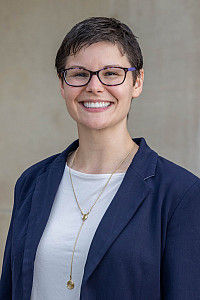Q&A with new CAPS director Kodee Walls
By Kirk Johannesen
October 09, 2023
The intersection of impactful coursework in her intended major and personal interactions with counseling psychology personnel helped Kodee Walls realize a career change was best. That new path has led her to the role of director of Counseling and Psychological Services at Indiana University Bloomington, which she began this semester.

As a student worker in the counseling psychology department, her interactions with the faculty, staff and graduate students helped Walls find her professional home.
“While there are many roles I could assume with my degree, I knew from the start that clinical work, training and leadership made my heart sing,” Walls said.
She eventually earned a doctorate in counseling psychology and became a licensed psychologist. Most recently she was the associate director of CAPS at Kansas State University.
Walls took some time recently to discuss coming to IU, mental health care and goals for the CAPS office.
Question: What interested you about coming to IU Bloomington and taking the Counseling and Psychological Services director job?
Answer: When researching the institution from a professional perspective, the campus community’s collaborative nature and the continued direct support of students were huge selling points. Of particular interest were two core principles of IU 2030: The Indiana University Strategic Plan:
- Commitment to diversity, equity and inclusion.
- Culture of respect and integrity.
Additionally, student health and well-being are being prioritized at the institutional level, which is no small feat.
Regarding CAPS, it was clear that the department was on the cusp of some incredibly dynamic changes to service delivery to increase student access and help create customized plans of action to support IU Bloomington students’ mental health needs.
Q: CAPS is moving to a stepped care approach for mental health. What does that mean, and how is it different and better than the past approach?
A: It’s not unusual for counseling centers to implement a waitlist for students seeking service. This can be driven by multiple factors, including lower staffing levels due to turnover, a lack of available mental health resources in the community and limited service options within the counseling center.
The “traditional model” of service often relies on pre-scheduled intakes and has few service options for students: individual or group psychotherapy and psychiatric care. Once groups fill up and all the intake spots are taken, students are added to a waitlist. The traditional model also assumes a one-size-fits-all approach to mental health care.
A stepped care model recognizes that each person’s needs are unique and do not require the same level of intensity. It demands expanding service options to meet the diversity of needs. Stepped care invites collaboration, problem-solving and client empowerment, which does not necessarily result in a referral for individual psychotherapy.
CAPS has moved beyond our previously limited options of individual and group psychotherapy and crisis services. Our expanded services include nearly a dozen options.
Q: What’s important for faculty and staff to know about helping students who might be in need of mental health services?
A: Student tears do not equate to needing a therapist. Sometimes, your best tools as a non-mental-health professional are a box of tissues and 10 minutes of listening.
While it’s often with the best of intentions that faculty and staff immediately send a student to CAPS, I’ve met with students who experience this as rejection. I encourage colleagues to consult about recommendations.
The exception is a mental health crisis, which can look like a student disclosing thoughts of suicide or urges to self-harm, expressing a desire to hurt or kill someone else, or exhibiting unusual or bizarre behavior. In these instances, we encourage the faculty or staff member to bring the student directly to CAPS between 8 a.m. and 4:30 p.m.; we have crisis therapists or emergency services clinicians available. If a staff or faculty member is unsure, they should call 812-855-5711 and consult with an available clinician.
We also use an after-hours crisis service. People can call our office number, or dial 988, and they’ll be routed to our after-hours line. They won’t speak with CAPS staff, but they will connect with a clinician who can problem-solve whatever the crisis situation is. We also receive a record of the call and follow up with students who contacted the line.
Also, CAPS services are entirely voluntary and confidential.
Q: What goals do you have for CAPS?
A: My primary goals are to develop and amplify inclusion, justice, restoration and liberation efforts. Mental health care, grounded in a multicultural framework, is liberation. I want to foster a culture of freedom on our campus through comprehensive and holistic well-being and disentangle the assumption that mental health and well-being are only the responsibility of mental health professionals.
Practically, I aim to accomplish this through continued inter-professional collaborations with campus partners, prevention and outreach efforts, comprehensive interventions in clinical care and enhanced training opportunities. I also encourage and invite stakeholder feedback to ensure these goals are met.
Kirk Johannesen is a communications consultant in the Office of the Vice President for Communications and Marketing.